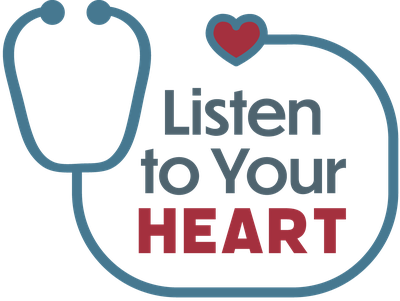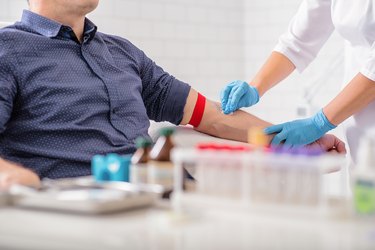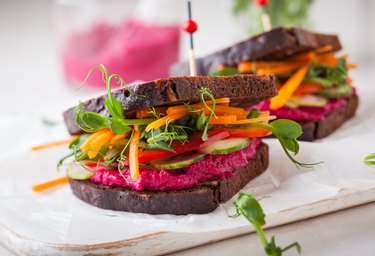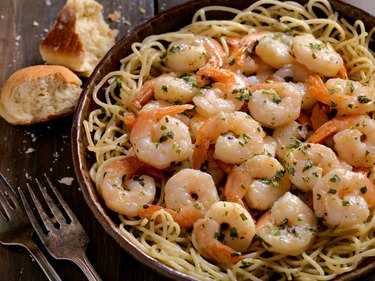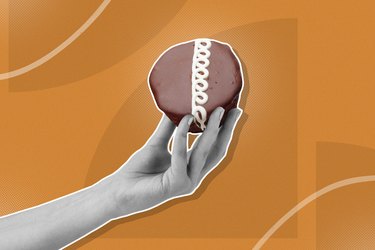
High cholesterol is a serious problem in the U.S., affecting nearly 2 in 5 adults, according to the Centers for Disease Control and Prevention (CDC). Avoiding high-cholesterol foods may seem like a simple way to solve this crisis — but in reality, the connection between diet and blood cholesterol levels is more complicated.
Yes, dietary cholesterol is present in certain foods, and eating these was long to thought to affect blood cholesterol levels in the body.
Video of the Day
Video of the Day
But today, experts no longer think the cholesterol in food is as problematic as they once believed, and the carbs and fats you eat likely play a larger role in a person's overall cardiovascular health, according to the Harvard T.H. Chan School of Public Health.
Because cholesterol is also produced by our bodies, genetics are also a big factor. Other lifestyle components — like physical activity, smoking and eating a lot of processed or fried foods — can make a difference, too.
It's a complex topic, and it's normal to be confused about what you should — and shouldn't — eat and do to keep your cholesterol at a healthy level. Here, we'll break down the latest science on the topic, and get expert opinions on what really matters.
Cholesterol in the Body
Cholesterol is a fatty, waxy substance that circulates in our blood, explains Luke Laffin, MD, a cardiologist at the Cleveland Clinic. It's produced by the liver and, because of genetic and lifestyle differences, some people make more cholesterol than others.
The body needs cholesterol to build cells, as well as making vitamins and hormones, according to the American Heart Association (AHA). But too much cholesterol can build up and form plaques that clog arteries, making them stiff and narrow, so it's difficult for blood to circulate freely in the body. This condition is called atherosclerosis, and it raises a person's risk for blood clots, heart attacks and strokes.
There are two types of cholesterol: LDL, which stands for low-density lipoprotein, and HDL, which stands for high-density lipoprotein. LDL cholesterol is considered "bad" cholesterol, because it increases the risk of plaque buildup (aka atherosclerosis), which in turn increases your risk of heart disease, stroke and peripheral artery disease (PAD), according to the AHA.
HDL cholesterol, on the other hand, is considered "good" cholesterol because it transports cholesterol molecules from the bloodstream back to the liver for disposal, according to the Harvard T.H. Chan School of Public Health.
Cholesterol in Food
Just like cholesterol is produced in the human body, it's also produced by the animals we consume for food. "Anything with a liver is going to have cholesterol," says Gabrielle Mancella, RD, a corporate wellness dietitian at Orlando Health.
That cholesterol isn't just circulating in animals' bloodstreams; it's also present throughout their bodies — and in the animal products we eat, such as meat, poultry, eggs, milk and other dairy products.
Plants, on the other hand, do not contain cholesterol. Some plant-based products (like coconut and palm oil), however, do contain fats that can affect cholesterol levels in the body — more on that later.
Does Dietary Cholesterol Raise Blood Cholesterol?
Scientists used to think eating a lot of dietary cholesterol had a significant effect on cholesterol levels in the blood. High-cholesterol foods that had previously been though of as healthy — like eggs and shrimp, for example — have made lists of foods to avoid because of these assumptions.
Today, health experts know it's not that simple. In a December 2019 scientific advisory statement from the AHA in the journal Circulation, researchers concluded the latest science on dietary cholesterol "does not indicate a significant association with cardiovascular disease risk."
Instead, research suggests saturated and trans fats in foods have a much bigger effect on cholesterol levels than dietary cholesterol itself. One reason for the confusion could be that foods high in cholesterol — like butter, cheese and beef, for example — also tend to be high in saturated fats. "Most foods contributing cholesterol to the U.S. diet are usually high in saturated fat or consumed with foods high in saturated fat," per the Circulation report.
So does that mean dietary cholesterol plays no role whatsoever in blood cholesterol? Not exactly, says Dr. Laffin. "There still is not true consensus from medical professionals on this topic," he says.
"We know that about 70 to 80 parent of cholesterol is produced in the liver, and we really don't have a lot of control over that," he adds. "But the other 20 to 30 percent can certainly be related to diet, and that can really vary from person to person."
For example, the Circulation statement points out people with diabetes should still be "cautious in consuming foods rich in cholesterol." Some people also have genetic predispositions that make them more sensitive to the effects of dietary cholesterol, Dr. Laffin says.
What to Eat, and What to Avoid, for Healthy Cholesterol
For overall heart health and healthy cholesterol levels, Dr. Laffin recommends following a "diet of moderation," and favors a Mediterranean-style eating plan.
"Eating more whole foods and more plant-based foods, and eliminating packaged and highly processed foods, are some of the best things you can do," he says.
Mancella agrees it's important to limit the amount of saturated fats in your diet, and to make sure you're getting plenty of plant-based foods like fruits, vegetables, nuts and seeds.
Not only are these foods low in saturated fat and free of dietary cholesterol, but they're also high in fiber — an important weapon in the fight against high blood cholesterol.
"One of fiber's most important jobs is to remove cholesterol from the body," Mancella says. "It basically creates a little nest for the cholesterol molecules to sleep in and be shipped out with our waste."
It's also important to avoid trans fats, which are often found in fried foods, packaged baked goods, margarines and vegetable shortening. Like saturated fats, these molecules trigger the liver to make more cholesterol and have been shown to raise levels of LDL cholesterol specifically.
What's more, a July 2020 analysis in BMJ Evidence-Based Medicine <idata-stringify-type="italic"> </idata-stringify-type="italic">reviewed current diet guidelines for people with familial hypercholesterolemia and found a a low-carbohydrate diet significantly improves heart disease biomarkers compared to a low-fat diet, calling for more clinical trials around this.
What About Shrimp?
While Dr. Laffin doesn't think people should cut out shellfish completely, he does warn this food group tends to be high in cholesterol. A 3-ounce serving of shrimp, for example, is only about 100 calories but contains 179 milligrams of cholesterol, according to the USDA; that's 60 percent of the recommended daily value of 300 milligrams.
"The bottom line is we really don't know what that means for every person," he says. "When we talk about how people should eat more fish, we really don't mean shrimp and lobster and crab — we mean things like salmon and halibut."
What About Eggs?
For most people, one egg a day is likely perfectly safe and healthy, according to Harvard Health Publishing. In an October 2018 study in Heart, researchers found eating up to one egg daily was associated with a lower risk of heart disease.
But other results remain mixed: Later, a March 2019 meta-analysis in JAMA found the more eggs people ate, the higher their risk for heart disease and death — a relationship that seemed to be directly linked to dietary cholesterol intake.
Still, Dr. Laffin says, eggs are a good source of protein and nutrients like vitamin B12 and zinc, and most people can eat up to six eggs a week without worrying about their effects on heart health. (One large egg contains 186 milligrams of cholesterol, or about 62 percent of the recommended daily value, according to the USDA.)
Medication for High Cholesterol
While diet is certainly important for overall heart health, sometimes even the healthiest diet and lifestyle may not be enough to fully protect against high cholesterol. This may be especially true for people with a genetic condition called familial hypercholesterolemia, per the AHA.
"We've seen people who are vegetarians and marathon runners who still have dangerously high levels," Dr. Laffin says. "If you have family members with really high cholesterol or a high risk for heart disease — if they've had a heart attack in their 30s or 40s, for example — that can be a sign that there's a genetic component there."
That's why it's important to know your cholesterol numbers, as well as your family history, and to talk with your doctor if you think you're at risk for or have high cholesterol. Together, you'll discuss the best course of treatment for your unique circumstances, preferences and risk factors.
There are several types of cholesterol medications available, including statins, ACL inhibitors and niacin, according to the AHA. Millions of people take statins, which lower your LDL cholesterol while raising your HDL cholesterol, according to the Cleveland Clinic. In fact, they're the most commonly prescribed types of medications, per the Cleveland Clinic.
"It's not that it's one or the other, lifestyle or medication," Dr. Laffin says. "You still have to watch your diet and exercise, and those things are going to be beneficial — but it may be just as important to add a drug to your regimen as well."
- Centers for Disease Control and Prevention: "Cholesterol"
- American Heart Association: "Control Your Cholesterol"
- My Food Data: "Nutrition Facts for Cooked Shrimp"
- American Heart Association: "Familial Hypercholesterolemia"
- JAMA: "Associations of Dietary Cholesterol or Egg Consumption With Incident Cardiovascular Disease and Mortality"
- My Food Data: "Nutrition Facts for Eggs (Raw)"
- BMJ Evidence-Based Medicine: "Dietary Recommendations for Familial Hypercholesterolaemia: an Evidence-Free Zone "
- AHA: "HDL (Good), LDL (Bad) Cholesterol and Triglycerides"
- AHA: "Cholesterol Medications"
- Cleveland Clinic: "Statins"
- Harvard T.H. Chan School of Public Health: "Cholesterol"
- Circulation: "Dietary Cholesterol and Cardiovascular Risk: A Science Advisory From the American Heart Association"
- Harvard Health Publishing: "Ask the Doctor: Are eggs risky for heart health?"
- Heart: "Associations of egg consumption with cardiovascular disease in a cohort study of 0.5 million Chinese adults "
Is this an emergency? If you are experiencing serious medical symptoms, please see the National Library of Medicine’s list of signs you need emergency medical attention or call 911.
